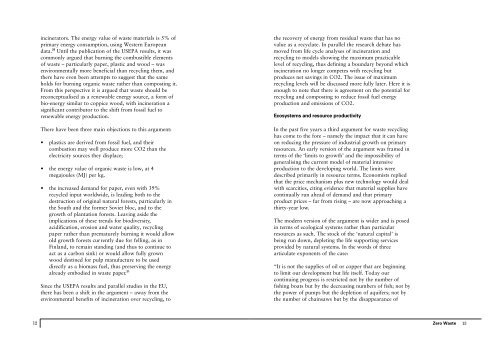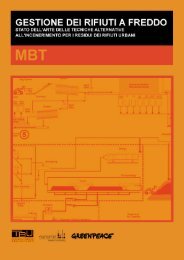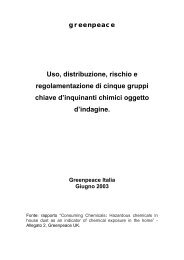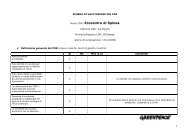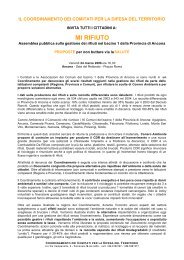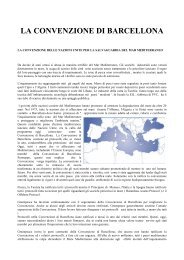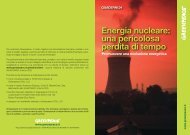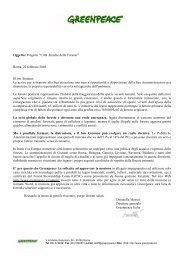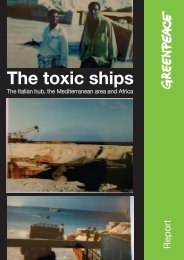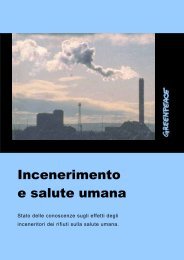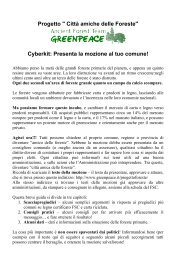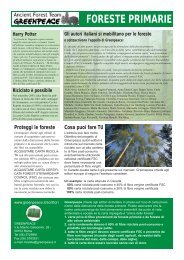Zero Waste by Robin Murray, Greenpeace Environmental Trust 2002
Zero Waste by Robin Murray, Greenpeace Environmental Trust 2002
Zero Waste by Robin Murray, Greenpeace Environmental Trust 2002
Create successful ePaper yourself
Turn your PDF publications into a flip-book with our unique Google optimized e-Paper software.
incinerators. The energy value of waste materials is 5% of<br />
primary energy consumption, using Western European<br />
data. 20 Until the publication of the USEPA results, it was<br />
commonly argued that burning the combustible elements<br />
of waste – particularly paper, plastic and wood – was<br />
environmentally more beneficial than recycling them, and<br />
there have even been attempts to suggest that the same<br />
holds for burning organic waste rather than composting it.<br />
From this perspective it is argued that waste should be<br />
reconceptualised as a renewable energy source, a form of<br />
bio-energy similar to coppice wood, with incineration a<br />
significant contributor to the shift from fossil fuel to<br />
renewable energy production.<br />
There have been three main objections to this argument:<br />
• plastics are derived from fossil fuel, and their<br />
combustion may well produce more CO2 than the<br />
electricity sources they displace;<br />
• the energy value of organic waste is low, at 4<br />
megajoules (MJ) per kg.<br />
• the increased demand for paper, even with 39%<br />
recycled input worldwide, is leading both to the<br />
destruction of original natural forests, particularly in<br />
the South and the former Soviet bloc, and to the<br />
growth of plantation forests. Leaving aside the<br />
implications of these trends for biodiversity,<br />
acidification, erosion and water quality, recycling<br />
paper rather than prematurely burning it would allow<br />
old growth forests currently due for felling, as in<br />
Finland, to remain standing (and thus to continue to<br />
act as a carbon sink) or would allow fully grown<br />
wood destined for pulp manufacture to be used<br />
directly as a biomass fuel, thus preserving the energy<br />
already embodied in waste paper. 21<br />
Since the USEPA results and parallel studies in the EU,<br />
there has been a shift in the argument – away from the<br />
environmental benefits of incineration over recycling, to<br />
the recovery of energy from residual waste that has no<br />
value as a recyclate. In parallel the research debate has<br />
moved from life cycle analyses of incineration and<br />
recycling to models showing the maximum practicable<br />
level of recycling, thus defining a boundary beyond which<br />
incineration no longer competes with recycling but<br />
produces net savings in CO2. The issue of maximum<br />
recycling levels will be discussed more fully later. Here it is<br />
enough to note that there is agreement on the potential for<br />
recycling and composting to reduce fossil fuel energy<br />
production and emissions of CO2.<br />
Ecosystems and resource productivity<br />
In the past five years a third argument for waste recycling<br />
has come to the fore – namely the impact that it can have<br />
on reducing the pressure of industrial growth on primary<br />
resources. An early version of the argument was framed in<br />
terms of the ‘limits to growth’ and the impossibility of<br />
generalising the current model of material intensive<br />
production to the developing world. The limits were<br />
described primarily in resource terms. Economists replied<br />
that the price mechanism plus new technology would deal<br />
with scarcities, citing evidence that material supplies have<br />
continually run ahead of demand and that primary<br />
product prices – far from rising – are now approaching a<br />
thirty-year low.<br />
The modern version of the argument is wider and is posed<br />
in terms of ecological systems rather than particular<br />
resources as such. The stock of the ‘natural capital’ is<br />
being run down, depleting the life supporting services<br />
provided <strong>by</strong> natural systems. In the words of three<br />
articulate exponents of the case:<br />
“It is not the supplies of oil or copper that are beginning<br />
to limit our development but life itself. Today our<br />
continuing progress is restricted not <strong>by</strong> the number of<br />
fishing boats but <strong>by</strong> the decreasing numbers of fish; not <strong>by</strong><br />
the power of pumps but the depletion of aquifers; not <strong>by</strong><br />
the number of chainsaws but <strong>by</strong> the disappearance of<br />
12<br />
<strong>Zero</strong> <strong>Waste</strong><br />
13


